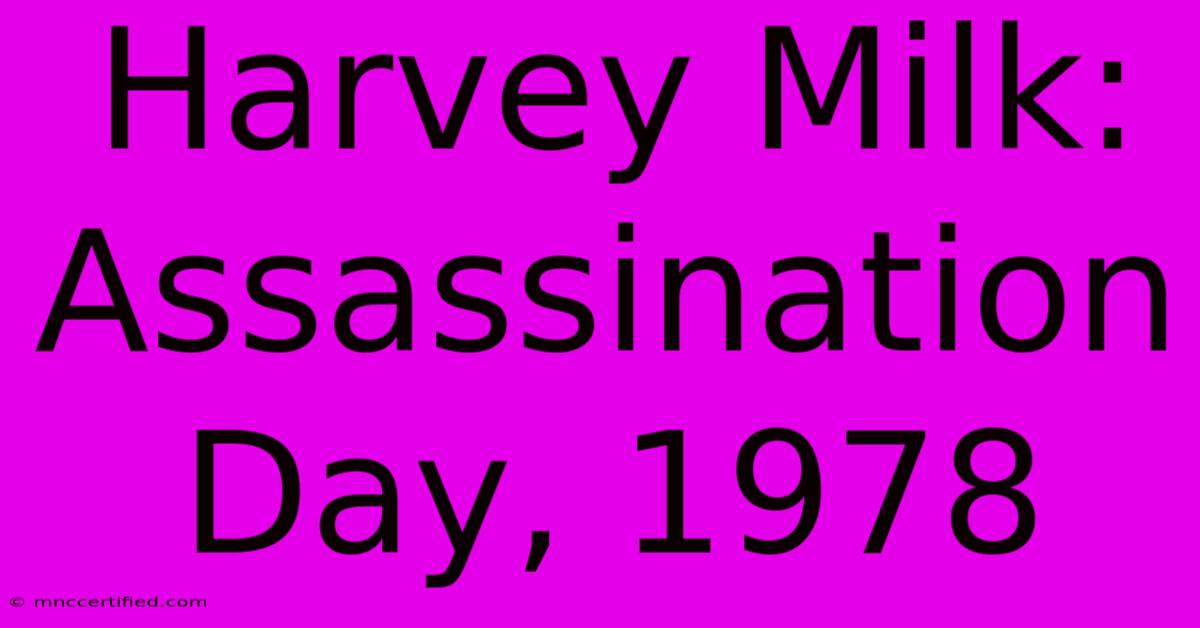Harvey Milk: Assassination Day, 1978

Table of Contents
Harvey Milk: Assassination Day, November 27, 1978 – A Tragedy and a Legacy
November 27th, 1978, marks a somber day in American history: the assassination of Harvey Milk, a pioneering gay rights activist and the first openly gay person to be elected to public office in California. His murder, alongside that of Mayor George Moscone, sent shockwaves through the nation and profoundly impacted the LGBTQ+ rights movement. This article delves into the events of that fateful day, exploring the circumstances surrounding the assassinations and the lasting legacy of Harvey Milk.
The Day That Changed Everything: A Timeline of November 27th, 1978
The day began seemingly ordinary for Harvey Milk. He was busy with his duties as a San Francisco Supervisor, advocating for the issues he championed: gay rights, affordable housing, and improved public education. Little did he know, his life was about to be tragically cut short.
-
Morning: Milk attended to his usual schedule, engaging in meetings and community outreach. He was known for his energetic and approachable nature, connecting with people from all walks of life.
-
Afternoon: Tensions were simmering beneath the surface of San Francisco's political landscape. Dan White, a former San Francisco Police Officer and Milk's colleague on the Board of Supervisors, had recently resigned from his position, fueling speculation and unrest.
-
Late Afternoon/Early Evening: The fateful events unfolded. Dan White, armed with a .38 caliber revolver, entered City Hall. He confronted and ultimately shot and killed Mayor George Moscone. Following this act, White proceeded to Milk's office, where a similar tragedy occurred.
-
Evening: News of the assassinations spread rapidly, sending a wave of grief and outrage through San Francisco and beyond. The city plunged into mourning, grappling with the loss of two prominent figures.
The Aftermath: Trials, Trials, and the Rise of a Movement
The subsequent trial of Dan White captivated the nation. The defense argued for a verdict of "voluntary manslaughter" rather than murder, citing diminished capacity due to depression and "Twinkie defense" (referencing White's alleged consumption of junk food as a contributing factor to his emotional state). This controversial defense sparked outrage and further fueled the already intense emotions surrounding the case.
While White was ultimately convicted of voluntary manslaughter, the lighter sentence ignited widespread protests and demonstrations. The public outcry exemplified the deep-seated anger and frustration over the perceived injustice of the verdict. This event served as a catalyst for the LGBTQ+ rights movement, galvanizing activists and intensifying the fight for equality and justice.
The Enduring Legacy of Harvey Milk: A Symbol of Hope and Courage
Despite his untimely death, Harvey Milk's legacy continues to inspire. He stands as a symbol of hope, courage, and unwavering commitment to social justice. His impact extends far beyond the confines of San Francisco; he became a beacon of hope for LGBTQ+ individuals worldwide.
Milk's life and work highlight the importance of:
- Visibility and Representation: His election as an openly gay official challenged societal norms and paved the way for greater LGBTQ+ inclusion in politics.
- Community Organizing: Milk's ability to mobilize and inspire community action was instrumental in his success and remains a model for activists today.
- Political Activism: He demonstrated the power of political engagement in achieving social change.
The Harvey Milk story serves as a powerful reminder of the ongoing struggle for LGBTQ+ rights and the importance of continuing the fight for equality and justice. His life and assassination continue to be studied and discussed, shaping conversations about political violence, social justice, and the enduring power of hope in the face of adversity. His legacy compels us to remember the price of progress and the importance of celebrating and protecting the lives of all members of the LGBTQ+ community.
Keywords: Harvey Milk, assassination, November 27, 1978, San Francisco, George Moscone, Dan White, LGBTQ+ rights, gay rights, political assassination, social justice, civil rights movement, Twinkie defense, American history, homophobia, activism, legacy, equality, justice.

Thank you for visiting our website wich cover about Harvey Milk: Assassination Day, 1978. We hope the information provided has been useful to you. Feel free to contact us if you have any questions or need further assistance. See you next time and dont miss to bookmark.
Featured Posts
-
Tariffs Hurt Us Allies Say
Nov 27, 2024
-
Man City 3 3 Feyenoord Match Stats
Nov 27, 2024
-
Passport Card Insurance Israel
Nov 27, 2024
-
Mack Brown Fired Espn Reports
Nov 27, 2024
-
Russia Expels Uk Diplomat Espionage Claim
Nov 27, 2024